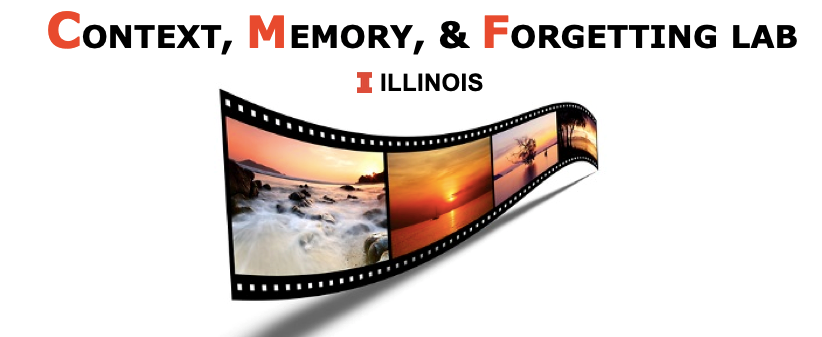 The Context, Memory, and Forgetting Lab investigates the role of context in episodic memory. In our constantly changing environment, we process enormous amounts of information on a daily basis. While we may not pay particularly close attention to the context in which we study and learn, context plays a fundamental role in memory as it provides the "setting" in which memories are formed. The research topics in this lab evolve around our fundamental interest in how context shapes and organizes our episodic memories, as well as how context influences the retrieval of memories. We use a variety of methods, including behavioral experiments, neuropsychological studies involving fMRI, eye-tracking studies, as well as computational modeling approaches to arrive at a deeper understanding of the role of context in memory. We study these questions with different populations, including but not limited to: studies with older adults, younger adults with individual differences in executive control, as well as adults with vulnerability to various forms of mental illness.
The Context, Memory, and Forgetting Lab investigates the role of context in episodic memory. In our constantly changing environment, we process enormous amounts of information on a daily basis. While we may not pay particularly close attention to the context in which we study and learn, context plays a fundamental role in memory as it provides the "setting" in which memories are formed. The research topics in this lab evolve around our fundamental interest in how context shapes and organizes our episodic memories, as well as how context influences the retrieval of memories. We use a variety of methods, including behavioral experiments, neuropsychological studies involving fMRI, eye-tracking studies, as well as computational modeling approaches to arrive at a deeper understanding of the role of context in memory. We study these questions with different populations, including but not limited to: studies with older adults, younger adults with individual differences in executive control, as well as adults with vulnerability to various forms of mental illness.
Our Principal Investigator is Lili Sahakyan.
Check out the tabs below or our website here to learn more.
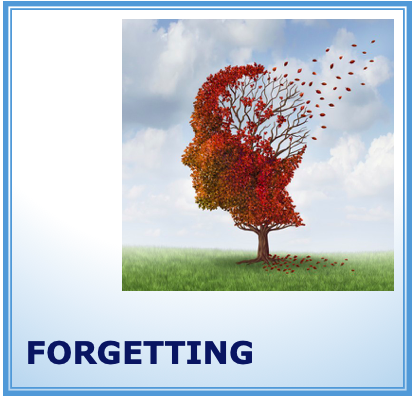 Everyday forgetting is an inevitable process that occurs largely outside of our conscious awareness or intentions, usually causing annoyance when it becomes apparent. Forgotten bills, misplaced keys, and missed birthdays uncomfortably remind us how frustrating it is to forget things. However, there are occasions when forgetting could be functional and adaptive. For example, when checking out of a hotel, we do not want to retain the number of the room where we stayed; purging that information out of mind helps declutter it. In this day of constantly needing to update passwords, it is functional to forget the old passwords. In extreme cases, such as when memories are traumatic, it can be dysfunctional to ruminate on them, and one may wish to reduce their accessibility. Thus, it is not always the case that remembering is the desired outcome, and forgetting is the flaw. Sometimes remembering is the undesired outcome, and forgetting is the virtue.
Everyday forgetting is an inevitable process that occurs largely outside of our conscious awareness or intentions, usually causing annoyance when it becomes apparent. Forgotten bills, misplaced keys, and missed birthdays uncomfortably remind us how frustrating it is to forget things. However, there are occasions when forgetting could be functional and adaptive. For example, when checking out of a hotel, we do not want to retain the number of the room where we stayed; purging that information out of mind helps declutter it. In this day of constantly needing to update passwords, it is functional to forget the old passwords. In extreme cases, such as when memories are traumatic, it can be dysfunctional to ruminate on them, and one may wish to reduce their accessibility. Thus, it is not always the case that remembering is the desired outcome, and forgetting is the flaw. Sometimes remembering is the undesired outcome, and forgetting is the virtue.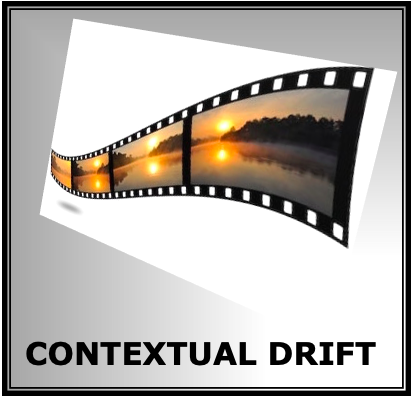 When we remember things in a context that is different from the one in which we learned it, we experience forgetting. This phenomenon occurs not only with physical environments but also with psychological or internal environments. Our lab was the first to demonstrate that changes in mental context (such as drastic changes in the thoughts you experience) can cause forgetting. We have demonstrated that we can achieve motivated forgetting when we engage in thought substitution, by thinking of things unrelated to the content of what we are attempting to forget. Importantly not all thought substitutions are effective. Some distracting thoughts produce more forgetting than others, and we are interested in why some thought substitutions are more effective than others.
When we remember things in a context that is different from the one in which we learned it, we experience forgetting. This phenomenon occurs not only with physical environments but also with psychological or internal environments. Our lab was the first to demonstrate that changes in mental context (such as drastic changes in the thoughts you experience) can cause forgetting. We have demonstrated that we can achieve motivated forgetting when we engage in thought substitution, by thinking of things unrelated to the content of what we are attempting to forget. Importantly not all thought substitutions are effective. Some distracting thoughts produce more forgetting than others, and we are interested in why some thought substitutions are more effective than others.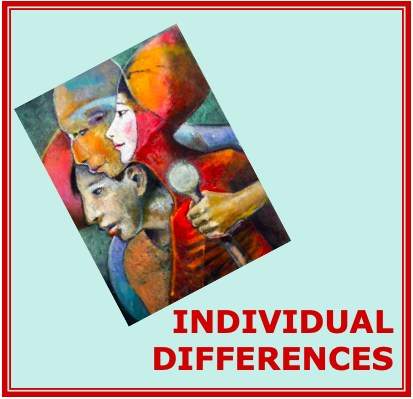 One line of work from our lab examines individual differences in memory, with a particular emphasis on how different populations process contextual information, and the implications of contextual processing for memory functioning. We use different behavioral paradigms, eye-tracking methodology, and neural activity to arrive at a deeper understanding of the role of context processing in different populations.
One line of work from our lab examines individual differences in memory, with a particular emphasis on how different populations process contextual information, and the implications of contextual processing for memory functioning. We use different behavioral paradigms, eye-tracking methodology, and neural activity to arrive at a deeper understanding of the role of context processing in different populations.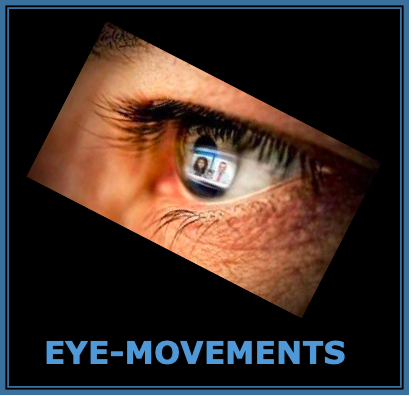 In this lab, we track eye-movements in order to investigate the underlying processes that are involved in forgetting. Eye-movements are a sensitive marker of memory, and expressions of memory can be observed even when behavioral responses indicate forgetting. Critically, we established eye movements as a novel marker that differentiates between incidental and intentional forms of forgetting. Incidental forgetting occurs when we forget despite our intention to remember, such as forgetting to send an email or forgetting a hotel room number where we are staying. In contrast, intentional forgetting refers to those situations when we actively engage in processes to down-regulate an unwanted/undesired memory (i.e., purposeful forgetting). Our research indicates the viewing behavior is particularly sensitive to these two forms of forgetting, consistent with other neural findings that also differentiate between incidental and intentional forgetting.
In this lab, we track eye-movements in order to investigate the underlying processes that are involved in forgetting. Eye-movements are a sensitive marker of memory, and expressions of memory can be observed even when behavioral responses indicate forgetting. Critically, we established eye movements as a novel marker that differentiates between incidental and intentional forms of forgetting. Incidental forgetting occurs when we forget despite our intention to remember, such as forgetting to send an email or forgetting a hotel room number where we are staying. In contrast, intentional forgetting refers to those situations when we actively engage in processes to down-regulate an unwanted/undesired memory (i.e., purposeful forgetting). Our research indicates the viewing behavior is particularly sensitive to these two forms of forgetting, consistent with other neural findings that also differentiate between incidental and intentional forgetting. 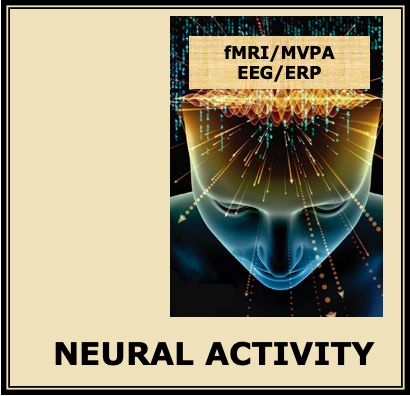 Forgetting is an important and natural process, but what does forgetting look like in the brain? To investigate this question, we test participants' memory while measuring brain activity using tools such as electroencephalography (EEG) and functional magnetic resonance imaging (fMRI). In order to have a better understanding of how context is represented in the brain, and how it may shift/drift, we have to measure not just global changes in neural activity, but also changes in distributed patterns of activity. To this end, we use advanced techniques such as multivariate pattern analysis (MVPA) and representational similarity analysis (RSA) to examine the neural activity of brain patterns. We additionally use frequency tagging in EEG, a technique to tag a stimulus with a particular neural signal, to probe how specific contextual details may be reactivated or forgotten in a memory experiment.
Forgetting is an important and natural process, but what does forgetting look like in the brain? To investigate this question, we test participants' memory while measuring brain activity using tools such as electroencephalography (EEG) and functional magnetic resonance imaging (fMRI). In order to have a better understanding of how context is represented in the brain, and how it may shift/drift, we have to measure not just global changes in neural activity, but also changes in distributed patterns of activity. To this end, we use advanced techniques such as multivariate pattern analysis (MVPA) and representational similarity analysis (RSA) to examine the neural activity of brain patterns. We additionally use frequency tagging in EEG, a technique to tag a stimulus with a particular neural signal, to probe how specific contextual details may be reactivated or forgotten in a memory experiment.